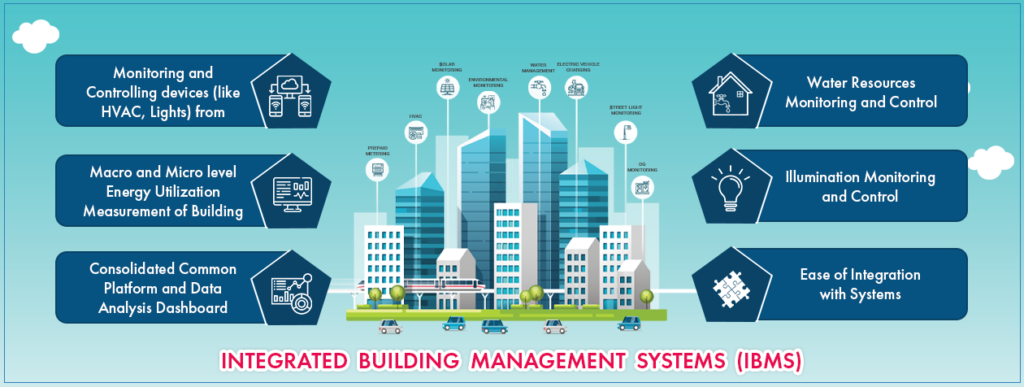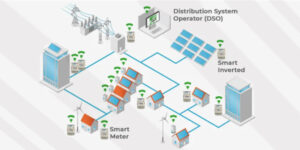In today’s rapidly advancing world, the integration of technology and automation has become crucial for the efficient management of various systems. One such innovation is the Integrated Building Management System (IBMS), a comprehensive solution that combines multiple building systems into a single, centralized control system. IBMS plays a pivotal role in enhancing the functionality, efficiency, and sustainability of buildings across different sectors, including residential, commercial, and industrial.
What are Integrated Building Management Systems?
The Integrated Building Management Systems (IBMS) features are beneficial in monitoring a large group of housing societies or office premises. From monitoring and controlling devices (like HVAC, Lights) from remote locations, macro and micro-level energy utilization measurement of building, a consolidated common platform and data analysis dashboard, environmental monitoring, water resources monitoring and control, illumination monitoring and control, ease of integration with systems to security and surveillance also. All these features make the IBMS a unique platform.
IBMS acts as a central nervous system, enabling real-time data acquisition, analysis, and decision-making for optimal building performance and occupant comfort.
What are the Benefits of Implementing Integrated Building Management Systems?
- Enhanced Energy Efficiency: One of the key advantages of IBMS is its ability to optimize energy consumption within a building. By monitoring and controlling HVAC systems, lighting, and other energy-consuming devices, IBMS ensures efficient operation and reduces energy wastage. This results in significant cost savings and a reduced carbon footprint.
- Improved Occupant Comfort and Productivity: IBMS allows for precise control of environmental parameters such as temperature, humidity, and lighting levels. This enables building managers to create comfortable and productive indoor environments tailored to the specific needs of occupants. Optimized indoor conditions have been proven to enhance occupant well-being, satisfaction, and overall productivity.
- Streamlined Maintenance and Operations: The centralized monitoring and control capabilities of IBMS simplify the management and maintenance of building systems. Real-time alerts, predictive analytics, and remote access enable proactive maintenance, swift issue identification, and rapid troubleshooting. This leads to reduced downtime, minimized repair costs, and enhanced operational efficiency.
- Enhanced Safety and Security: Integrated Building Management Systems integrate security systems like access control, surveillance, and fire detection. By providing real-time monitoring, automated alarms, and coordinated response mechanisms, IBMS enhances building safety and security. Prompt detection and response to potential threats minimize risks, safeguard assets, and protect occupants.
- Data-Driven Decision Making: IBMS collects and analyzes a vast amount of data from various building systems. This data can be transformed into actionable insights using advanced analytics and reporting tools. By leveraging these insights, building managers can make informed decisions to optimize resource allocation, energy usage, and operational strategies.
Importance of Having a Proper Integrated Building Management Systems in 2023?
As we enter 2023, the significance of Integrated Building Management Systems becomes even more pronounced. In the face of growing environmental concerns and stringent regulations, buildings must prioritize sustainability. IBMS plays a pivotal role in achieving energy efficiency, reducing greenhouse gas emissions, and conserving resources. By adopting IBMS, building owners demonstrate their commitment to sustainability and contribute to a greener future.
Modern buildings are equipped with a plethora of complex systems that require seamless coordination and integration. IBMS provides a centralized platform to monitor and control these systems, simplifying operations and ensuring optimal performance. In 2023, as buildings become smarter and more technologically advanced, the need for IBMS becomes paramount.
IBMS enables building managers to meet these expectations by delivering customized experiences through intelligent automation and control. By implementing IBMS, buildings can attract and retain occupants while ensuring their satisfaction and well-being.
Integrated Building Management Systems offer significant cost savings in terms of energy efficiency, reduced maintenance costs, and optimized resource allocation. While the initial investment may be substantial, the long-term benefits and return on investment are substantial, making IBMS a financially sound decision for building owners and operators.
How Do Xenius Integrated Building Management Systems Benefit Societies?

Among the various Integrated Building Management Systems available, Xenius stands out as a prominent solution that brings multiple benefits to society:
- Seamless Integration: Xenius offers seamless integration of various building systems into a unified platform. It consolidates data and control functions, enabling efficient management and control of diverse systems within a building. This integration eliminates redundancies, streamlines operations, and enhances overall system performance.
- Intelligent Automation: Xenius employs advanced algorithms and artificial intelligence to automate and optimize building processes. It intelligently regulates HVAC systems, lighting, and energy consumption based on real-time data and occupancy patterns. This automation not only improves energy efficiency but also reduces human error and frees up resources for other critical tasks.
- Occupant-Centric Approach: Xenius prioritizes occupant comfort and well-being. It allows building managers to tailor environmental conditions to individual preferences, ensuring optimal comfort for occupants. By creating a personalized and user-friendly experience, Xenius enhances occupant satisfaction, productivity, and overall quality of life.
- Data Analytics and Insights: Xenius leverages data analytics and machine learning capabilities to generate actionable insights. It collects and analyzes vast amounts of data from building systems, providing valuable information on energy usage patterns, equipment performance, and maintenance needs. These insights empower building managers to make data-driven decisions for improved efficiency, sustainability, and operational strategies.
- Sustainability and Environmental Stewardship: Xenius promotes sustainability by optimizing energy usage, reducing waste, and lowering carbon emissions. Its intelligent control and automation features enable buildings to operate at peak efficiency while minimizing environmental impact. By embracing Xenius, society can make significant strides towards achieving a more sustainable and eco-friendly future.
IBMS solution offered by XENIUS is an integrated platform for monitoring and control of various critical parameters, improving and optimizing the operational efficiency of any building. With the potential of significant reduction of the expenses being incurred for its day-to-day operations as well as making it get closer to green concepts and reducing carbon footprints for a sustainable future.
Integrated Building Management Systems have emerged as game-changer in the management and operation of buildings. In 2023, their importance and benefits cannot be overstated. From energy efficiency and occupant comfort to streamlined processes and sustainability, IBMS such as Xenius offer a comprehensive solution for building owners and society at large. By embracing these systems, we can create smarter, more efficient, and more sustainable buildings that meet the evolving needs of occupants while contributing to a greener future. With the continuous advancements in technology, the role of Integrated Building Management Systems will continue to grow, shaping the way we design, operate, and experience buildings in the years to come.












